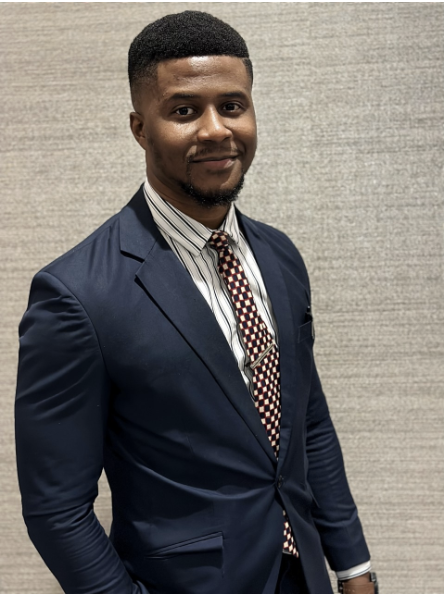Fidelis Anyanegbu is a lawyer from Nigeria pursuing an LLM at the University of Illinois. During his year in the United States, he is working as a member of the office staff for EJP.
In July of 2022, Fidelis Anyanegbu left his home in Anambra, Nigeria and boarded a plane headed for Illinois, which is where he would be spending the next year. He was coming to further his studies in law through a master’s program at the U of I, and, while still living in Nigeria, had already discovered EJP.
For the last five years, Fidelis has worked as a practicing lawyer. He has an impressive track record of professional achievements, including graduating with honors from Chukwuemeka Odumegwu Ojukwu University, and serving as the youngest-ever Law Students Associations President (LAWSA). Fidelis also studied at the renowned Nigerian Law School, Lagos Campus.
His drive to learn is what motivated Fidelis to seek an LLM, or a Master of Laws degree, at the University of Illinois. The appeal of studying in the United States was to broaden his world view and experience a different educational system. Fidelis researched universities that offered masters programs in law with concentrations in regulation, sustainability, and compliance. U of I was one of the top-rated schools in the country. When he was accepted, Fidelis started researching the university’s offerings and discovered EJP.
“I saw what EJP is all about, what they stand for, and it really piqued my interest. As a lawyer, I was looking for something that was in line with my profession…I arrived here on July 24th, I had an interview [with EJP] the next week,” Fidelis said.
Originally, Fidelis was going to be working with EJP at Danville Correctional Center. A number of clearance issues prevented that possibility, and instead he has been working as a member of the office staff on the U of I campus, a role in which he catalogs records, documents, and reports; enters data; keeps financial records; and coordinates meetings and events, among other tasks.
On April 7, 2023, Fidelis contributed to EJP’s series on prison systems around the world by offering a presentation about the Nigerian prison system. Among other topics, Fidelis’s talk touched on the overcrowded conditions in Nigerian prisons. The official prison capacity in the Nigerian prison system is 50,153. However, as of May 2023, the total prison population is 74,872 people, according to the World Prison Brief from the Institute for Crime & Justice Policy Research. This means that Nigerian prisons are operating at 145% of their capacity in terms of physical space.
Fidelis also addressed the fact that 70% of people incarcerated in Nigerian prisons are “on remand.” That means they are awaiting trial; they have not been convicted. (In the US, these individuals would typically be housed in county jails.) The average length of stay for those awaiting trial is an astonishing ten years. “This is an unfortunate situation that can befall anyone who doesn’t have proper legal representation,” he said.
Fidelis explains that complex societal systems give rise to this situation. First, the legal system in Nigeria is slow, as it is in many places around the world. Another factor is that judges claim to be reluctant to grant bail since so many people do not return to court on their court dates. Fidelis also pointed out that some people are in prison for their political views. Journalists can be imprisoned, as can everyday citizens who are outspoken on social media. “The government uses the Department of State Services, or the police, to clamp down on people who are clamoring for change,” Fidelis said.
But the prevailing factor is poverty. Fidelis shares that the vast majority of those facing extreme lengths of incarceration prior to trial are people of lower socio-economic status who cannot afford a lawyer to advocate for their bail. Many of these people rely on lawyers who can perform pro bono representation. “In the former law firms where I worked, between 2019 and 2022, we were able to secure the release and acquittal of about 50 to 55 people who had been incarcerated,” Fidelis said of his firms’ pro bono work.
Fidelis will graduate from the U of I in May of 2023, at which point he will engage in Optional Practical Training (OPT) in the U.S. When he returns to Nigeria, he’ll bring back all the knowledge and experience he’s gained by studying abroad. “I don’t even know how to begin to describe it…I’ve learned a whole lot in the space of one year.”

